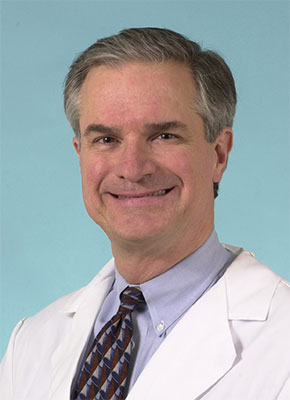
Jeffrey S. Crippin, MD
Professor of Medicine
Marilyn E. Bornefeld Chair in Gastrointestinal Research and Treatment
Associate Chairman for Clinical Programs
- Phone: 314-747-2066
- Fax: 314-454-5108
Related Links
Education
- Fellowship: Mayo Clinic, Rochester, MN (1991)
- Chief Residency: Kansas University, Kansas City, KS (1988)
- Residency: Kansas University, Kansas City, KS (1987)
- MD: Kansas University, Kansas City, KS (1984)
Biography
Dr. Crippin joined the Division in August, 2000, as Medical Director of Liver Transplantation. He attended medical school at the University of Kansas, then completed a residency in Internal Medicine at the Kansas University Medical Center in 1987. After serving as chief resident for a year, he began a fellowship in gastroenterology at the Mayo Clinic, which he completed in June 1991. He served as Director of Hepatology and Medical Director of Liver Transplantation at Baylor University Medical Center, Dallas, through July, 2000. Dr. Crippin has served as the chairman of the Public Policy Committee, Secretary-Treasurer, President-elect, and President of the American Society of Transplantation (AST). He has served on committees in the American Association for the Study of Liver Diseases. He lectures frequently at clinical conferences on topics ranging from chronic viral hepatitis to long-term care of the liver transplant recipient. His research interests include new treatments for chronic viral hepatitis, treatment and prevention of recurrent disease following liver transplantation, and assessment of liver function.
“My clinical research interests center around diseases leading to liver transplantation and their recurrence in the transplanted liver. The goal of any hepatologist is to prevent the progression of a disease to the point that transplantation is necessary. Thus, I am involved in clinical trials of antiviral agents used for the treatment of chronic hepatitis C. Interferon alfa and its long-acting pegylated form, in combination with ribavirin, now allow us to cure patients of a disease that is currently the leading indication for liver transplantation in the United States. Unfortunately, many patients progress to end-stage liver disease and its complications. Furthermore, infection of the transplanted liver is nearly universal, though antiviral agents are poorly tolerated and less efficacious in the transplant population. I am working, along with investigators at other centers, on studies to minimize the amount of post-transplant liver injury secondary to the hepatitis C virus. I am also studying a small group of our patients with liver allograft dysfunction following treatment with pegylated interferon and ribavirin. My other area of interest is the function of the cirrhotic liver, previously something that has been difficult to quantify. I am studying the clearance of indocyanine green as a measure of hepatocellular function in patients following placement of a transjugular intrahepatic portosystemic shunt. All of my research is designed with the goal of improving patient care and quality of life.”